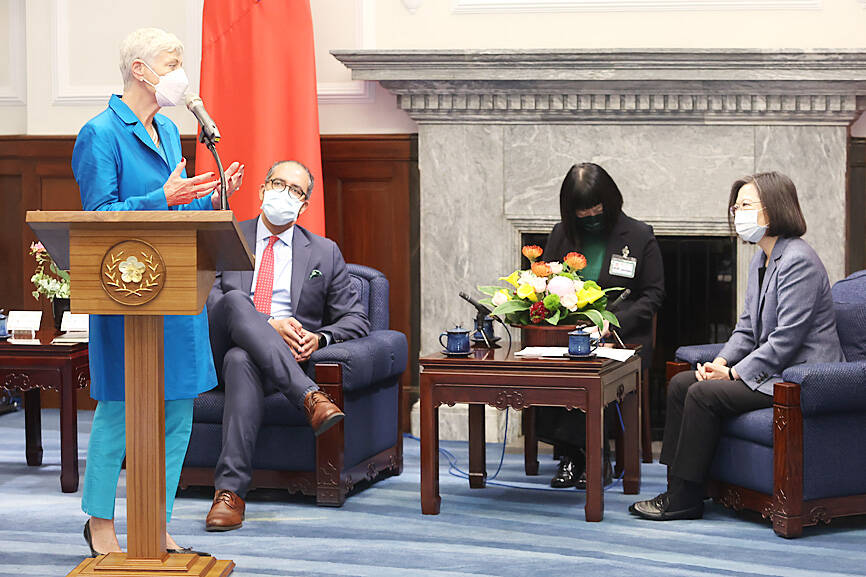Former US representative Will Hurd yesterday said visiting Taiwan has made him realize that China’s “one country, two systems” framework is not a feasible solution for Taiwan.
Hurd, who is visiting Taiwan with an international delegation, made the remarks when meeting with President Tsai Ing-wen (蔡英文) at the Presidential Office in Taipei.
There is bipartisan support for Taiwan in Washington, with Republicans and Democrats agreeing that only the 23.5 million Taiwanese can decide the nation’s future, said Hurd, a trustee at the Washington-based German Marshall Fund think tank.

Photo: CNA
Former German lawmaker Marieluise Beck said that the Russian invasion of Ukraine has changed mindsets in Europe, and has underscored the difficult challenge of maintaining freedom.
All democracies must make daily efforts to address that challenge, she said.
The purpose of the delegation’s visit is to respond to the threat of a similar invasion of Taiwan before it could occur, Beck said, adding that she hoped to hear Taiwan’s views on the future, as well as to learn how the international community can help the nation.
Tsai said the expansion of authoritarianism poses serious challenges to democracy globally, adding that democracies must bolster their alliances to jointly defend their shared values.
Taiwan would continue to bolster its self-defense capabilities, Tsai said, adding that she hopes the nation can cooperate with more democratic countries on ensuring peace and prosperity in the Indo-Pacific region.
Taiwan, the US and Europe should also bolster economic cooperation to create safer and more resilient supply chains, she added.
In related news, US lawmakers are poised to back as much as US$10 billion to bolster Taiwan’s defenses against growing threats from China as part of a compromise annual defense authorization bill, Bloomberg reporter Roxana Tiron wrote on Twitter on Wednesday.
Voice of America and US-based Web site Politico have in the past few months reported that the US Senate, the US House of Representatives Armed Services Committee and other committees have been negotiating the contents of the Fiscal Year 2023 National Defense Authorization Act.
A version of the bill that reflects cross-party compromises might be announced as soon as this week, and be voted on in the House and then the Senate next week.
Additional reporting by Reuters

CHAOS: Iranians took to the streets playing celebratory music after reports of Khamenei’s death on Saturday, while mourners also gathered in Tehran yesterday Iranian Supreme Leader Ayatollah Ali Khamenei was killed in a major attack on Iran launched by Israel and the US, throwing the future of the Islamic republic into doubt and raising the risk of regional instability. Iranian state television and the state-run IRNA news agency announced the 86-year-old’s death early yesterday. US President Donald Trump said it gave Iranians their “greatest chance” to “take back” their country. The announcements came after a joint US and Israeli aerial bombardment that targeted Iranian military and governmental sites. Trump said the “heavy and pinpoint bombing” would continue through the week or as long

TRUST: The KMT said it respected the US’ timing and considerations, and hoped it would continue to honor its commitments to helping Taiwan bolster its defenses and deterrence US President Donald Trump is delaying a multibillion-dollar arms sale to Taiwan to ensure his visit to Beijing is successful, a New York Times report said. The weapons sales package has stalled in the US Department of State, the report said, citing US officials it did not identify. The White House has told agencies not to push forward ahead of Trump’s meeting with Chinese President Xi Jinping (習近平), it said. The two last month held a phone call to discuss trade and geopolitical flashpoints ahead of the summit. Xi raised the Taiwan issue and urged the US to handle arms sales to

State-run CPC Corp, Taiwan (CPC, 台灣中油) yesterday said that it had confirmed on Saturday night with its liquefied natural gas (LNG) and crude oil suppliers that shipments are proceeding as scheduled and that domestic supplies remain unaffected. The CPC yesterday announced the gasoline and diesel prices will rise by NT$0.2 and NT$0.4 per liter, respectively, starting Monday, citing Middle East tensions and blizzards in the eastern United States. CPC also iterated it has been reducing the proportion of crude oil imports from the Middle East and diversifying its supply sources in the past few years in response to geopolitical risks, expanding

Pro-democracy media tycoon Jimmy Lai’s (黎智英) fraud conviction and prison sentence were yesterday overturned by a Hong Kong court, in a surprise legal decision that comes soon after Lai was jailed for 20 years on a separate national security charge. Judges Jeremy Poon (潘兆初), Anthea Pang (彭寶琴) and Derek Pang (彭偉昌) said in the judgement that they allowed the appeal from Lai, and another defendant in the case, to proceed, as a lower court judge had “erred.” “The Court of Appeal gave them leave to appeal against their conviction, allowed their appeals, quashed the convictions and set aside the sentences,” the judges